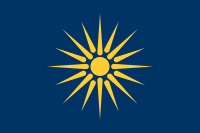Famous Macedonia
" Famous Macedonia " ( Greek : Μακεδονία ξακουστή - Makedonía xakustí ) is a folk song that is often regarded as the unofficial anthem of the Greek region of Macedonia .
It is with the Makedonomáchi (the "Macedonian Fighters" or [Greek] Macedonian Fighters) during the Greek struggle for the liberation of Macedonia and can be heard on parades and national anniversaries.
Until the changeover to a 24-hour program, it also marked the end of the radio programs of the regional Macedonian radio station "Radio-Makedonia 102FM" at midnight, it was played before the Greek national anthem.
According to the website of the Greek army , the hymn is a military song (εμβατήριο), it is based on the traditional “Macedonian dance” (Μακεδονικός Χορός). It is written in the Doric scale , in fifteen-syllable iambic verses (ιαμβικός δεκαπεντασύλλαβος). It is in 2/4 time and is also danced as chasápiko (χασάπικο). with a reference to Digenis Akritas , a heroic epic from Byzantine times . The text also refers to Alexander the Great , who is claimed to be the progenitor of the Greek Macedonians .
text
| Original modern Greek text | transcription | German translation |
|---|---|---|
|
Μακεδονία ξακουστή, Ήσουν και θα 'σαι ελληνική, Οι Μακεδόνες δεν μπορούν |
Makedonía xakoustí, Ísoun ke tha 'se ellinikí, I Makedónes den boroún |
Famous Macedonia You were and will remain Greek , The Macedonians cannot |
Web links
- Makedonia ksakusti sound sample (mp3; 1.6 MB)
Individual evidence
- ^ V. Roudometof: Collective Memory, National Identity and Ethnic Conflict: Greece, Bulgaria and the Macedonian Question . Greenwood Press, 2002, ISBN 0-275-97648-3 , p. 81.
